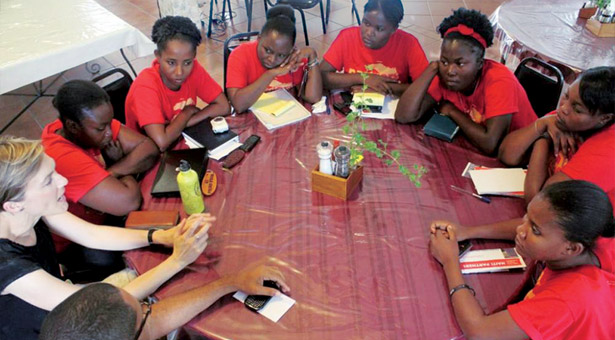The Bible & Theology Toward Christian Maturity
SPU Professor Examines Scripture With Haitian Seminarians
Haiti’s Next Leaders
By Jeffrey Overstreet (jeffreyo@spu.edu) | Photo Courtesy of Sara Koenig

Haitian seminary students talk with Sara Koenig (left) talk about balancing marriage,
motherhood, and ministry. “They wanted to know my story,” Koenig says.
After meeting with seminary students in Port-au-Prince, Haiti, Sara Koenig, assistant professor of biblical studies at Seattle Pacific University, and her fellow American travelers were discussing the season finale of television’s The Office. Their driver interrupted. Driving around what appeared to be a giant roundabout, he said, “That’s where they burned the bodies.”
The dust has only begun to settle after Haiti’s 2010 earthquake, the epicenter of which was just 15 miles from Port-au-Prince. The quake killed more than 220,000 people — far too many to bury — according to Haitian government figures. It was a jarring reminder, says Koenig, of the juxtaposition between her own American world and the world that she was visiting.
Koenig went to Haiti on the invitation of Kent Annan, co-director of Haiti Partners, and a former classmate of Koenig’s at Princeton Theological Seminary.
Haiti Partners aims to cultivate Haitian leadership; fewer than 10 percent of its staff members are Americans. The organization’s goal is threefold: to build schools and train teachers, to consult for NGOs, and to provide theological education for Haitian church leaders through the Micah Scholars program.
The Micah Scholars are a group of 25 Haitian men and women given scholarships to become pastors and teachers. They attend seminary, intern with Haiti Partners, and take part in retreats and conferences designed to equip them to lead.
Annan invited Koenig because he believed that the Micah Scholars would benefit from learning about her scholarship on biblical women. “Who Sara is, and the expertise she brings — it was just a perfect fit for us at this time,” he says.
Upon her arrival, Koenig attended a Pentecostal Haitian funeral and a burial procession for the grandmother of her host family. Later, spending the night in a lakou — a compound shared by several families — in a rural area outside Port-au-Prince, the family’s hospitality amazed her. “Even though they had just lost their grandmother,” she recalls, “they gave the four American men one room, and they gave me — the one American female — the biggest room in the house, while the whole family slept on the concrete floor.”
During her short stay, Koenig delivered lectures about social justice, women in ministry, and biblical interpretation.
The prophet Amos, she told the scholars, makes clear God’s desire for his followers to live righteously and treat people fairly. It’s a timely message. “The Haitian church has much more pastors will soon study a Creole translation of it.
“The lack of infrastructure in Haiti is shocking,” Koenig says. “But I was blown away by how committed these young people are to Haiti, how much they love it and want to see differences in the society.” While the shadow of the recent past darkens Haiti’s streets, Koenig sees the promise of a brighter future in the close attention that these rising leaders give to the Scriptures.
